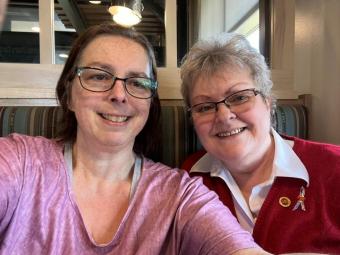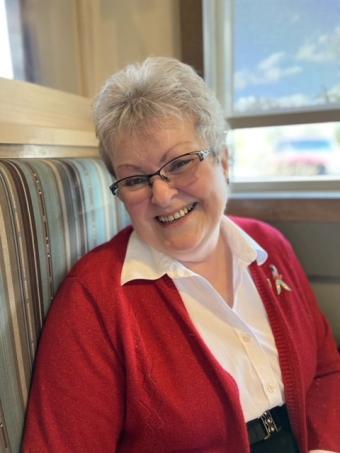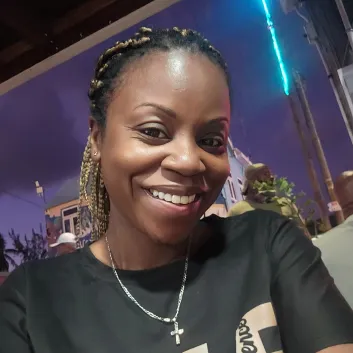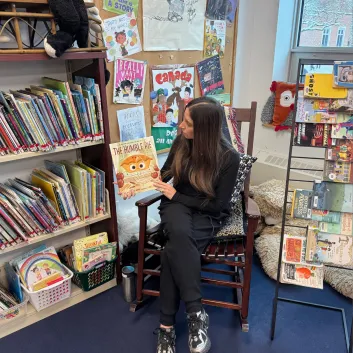- Volunteering & Giving
- August 28, 2024
Navigating MS Together
Donalda and Theresa's Stories
Donalda couldn’t seem to find hope in her new life after her MS diagnosis in 2009. She soon fell into a deep depression, worsened by a medication she couldn't tolerate. For two years, she hardly left her house, grappling with dark thoughts. The bridges where she lived, infamous for their tragic history, became one of those dark thoughts. Her husband constantly tried to get her out of the house, but she felt safe at home, away from judgmental stares and awkward conversations.
In 2011, her life took a pivotal turn. At a local health fair, Donalda’s daughter introduced her to Theresa who was manning an MS Canada booth. “Do you know someone that has MS?” Theresa asked her. For the first time in two years, Donalda admitted, “Me.” Theresa responded, “Me too. I was diagnosed in 1990.” The connection was instant and profound.

When Theresa offered a hug, something broke inside Donalda—in a good way. “I was looking at this beautiful woman who had been living with MS for 21 years and was still walking around, talking, and spreading awareness. It was life-changing for me. That one hug made me realize that I could still live a full life. Theresa helped me out of my depression and gave me hope. We've never lost that connection, and I'm forever grateful,” Donalda recalls.
Theresa’s MS journey began in 1990. Her diagnosis provided clarity in a time of uncertainty, and she was determined to find ways to cope and connect with others who understood her struggles. She started attending the Halifax chapter and eventually took on a leadership role to create MS support groups that never existed. “When I was diagnosed, I was excited to finally have a name for what was happening to me. My GP was treating me for anxiety, but I knew it was something more. Once I was diagnosed, I connected with MS Canada and began volunteering immediately,” Theresa says.
Inspired by Theresa’s selflessness and commitment to helping others, Donalda became an MS Peer Support Group volunteer in 2012. “There’s such an enrichment you get from volunteering,” Donalda says. “I do it because I know how lonely it was for me, and I wouldn’t wish the isolation I’d felt on anyone.” Both women are still passionately leading their support groups and changing lives every day.

Theresa found that peer support was a lifeline, providing emotional support, shared experiences, and practical guidance for people living with MS. Over time, she attended many MS events—volunteer conferences, education days, workshops, training sessions, retreats, and national conferences, where she gained invaluable knowledge to share with her group.
Peer Support Groups can vary in structure. Some meet in person, others are virtual or in a hybrid format. Some groups include people living with MS only, while others include partners, family, friends, and caregivers. “Hopeful Solutions,” the group that Theresa leads, now meets virtually and has structured meetings with goals and guidelines to ensure everyone feels safe and supported.
Theresa explains, “I pretty much started the self-help group in 1995. Our group was called ‘Hopeful Solutions’ because we were always looking for hope and solutions.”
Donalda adds, “For me, it was around 2012. I lived in Dartmouth, and there was a group called ‘Dartmouth MS Peer Support Group’ that I used to attend. When the facilitator stepped down, they asked me to take over. I've always been a volunteer, and it's a passion of mine to help where I can. I wanted to make a difference for people living with MS, just as Theresa did for me.”
“Theresa taught me how to run a peer support group, handle difficult situations, and listen without reacting. She’s been an invaluable mentor and friend,” Donalda says.
Both Theresa and Donalda believe in the power of being stronger together and ensuring that no one feels alone. Knowledge is power, and with education, support networks, and a positive attitude, they navigate the challenges of living with MS. They allow themselves to feel difficult emotions, not dwell on them.

As they help others living with MS, Theresa and Donalda are hopeful for a world without this disease—and they know the critical role donors play in making this a reality. Theresa would like donors to know that they’re making an incredible difference. “Donors allow us to improve our quality of life, provide programs and services, and fund research,” she says. “Because of our supporters, MS Canada is the organization it is today.”
Theresa, Donalda, and countless other MS Canada volunteers help make the world a better place for the MS community.
Your generosity gives so many people across Canada the support and hope they need on their journey. Learn about your impact on Canadians affected by MS in our MS Fall Progress Report.
Interested in joining a Peer Support Program? Learn more here.
- Log in to post comments

